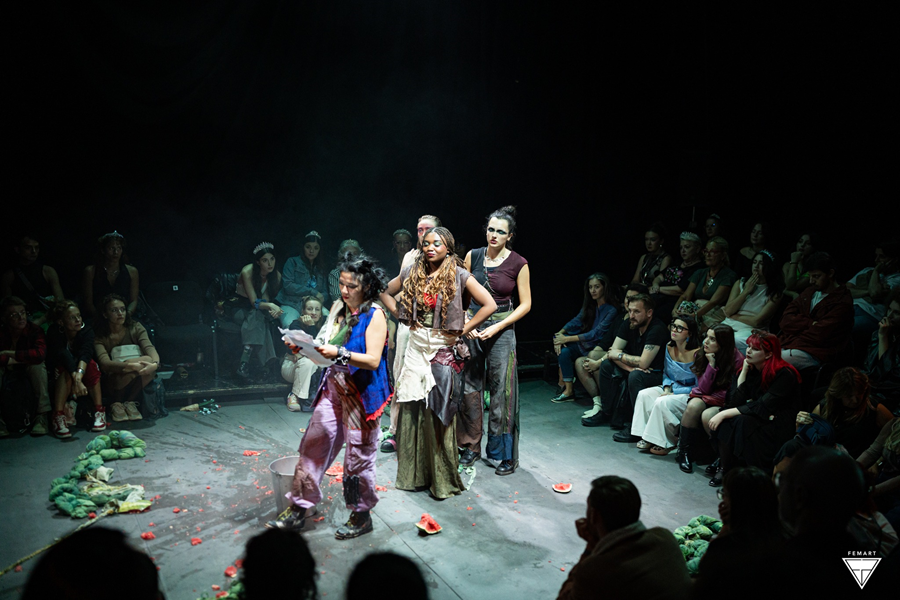By: Shqipe Malushi
Day 4, FemArt 12 Festival
September 28, 2024 | 21:00-22:10 | Oda Theater, Prishtina
Written by: Alice Birch | Directed by: Zana Hoxha | Cast: Olive McHugh, Tanaka Mpofu, Xixi Xiao, Natalia May
Produced by: London Academy of Music & Dramatic Arts (LAMDA)
On September 28th, 2024, Zana Hoxha brought Alice Birch’s “Revolt. She Said. Revolt Again” to Kosovo’s Oda Theater during the FemArt 12 Festival. The play, recently premiered at London’s Orange Tree Theater, was produced by LAMDA and captivated the Prishtina audience, with some attendees sitting on the floor due to the overflow. Among the crowd was the British Ambassador, who personally congratulated the director and cast.
“Revolt. She Said. Revolt Again” challenges traditional ideas of how women should behave, using a series of short, provocative scenes to question language, relationships, work, and everyday norms. Alice Birch’s writing deconstructs these societal expectations, reimagining them in bold ways. Hoxha’s direction takes this further by turning familiar actions and words on their heads, from the symbolism of marriage proposals to rethinking motherhood, aging, and love.
The play reflects the notion that “well-behaved women seldom make history” and highlights the restrictive language that has controlled women for centuries. Zana Hoxha emphasizes this, allowing her actresses to explore words and actions in ways that disrupt conventional theater. The women, played by McHugh, Mpofu, Xiao, and May, present a range of emotions, often raw and uncomfortable, leading the audience to reflect on deeply embedded societal limitations. One striking scene involving a woman and a broken watermelon pushes boundaries of intimacy and self-exploration, provoking the audience to confront their own reservations about freedom.
The play is structured in three parts, each experimenting with different storytelling techniques. In one particularly memorable scene, four women from different generations silently face the audience, representing the struggles women endure across time. This moment, like much of the play, blurs the line between performer and character, making the audience feel engaged in the unfolding experience.
Zana Hoxha’s innovative direction encouraged the actresses to break traditional theater norms, making a strong statement that patriarchy is not an unchangeable structure but a societal construct that can be dismantled. Beyond gender, the play explores deeper themes of choice, freedom, power, and control.
The performance concluded with a standing ovation, as the actors raised banners above their heads, inviting the audience to join in shouting “WE HAVE A CHOICE.” Through Zana Hoxha’s bold approach, the audience witnessed the power of women pushing boundaries, urging everyone to reflect and take part in challenging societal norms. The performance leaves lingering questions for those accustomed to traditional theater: Have we ever allowed ourselves such complete freedom, to cast off societal constraints?

